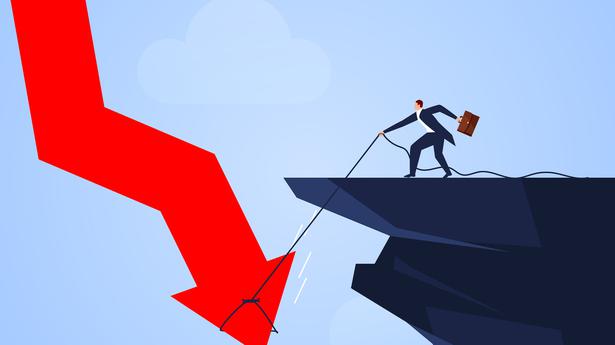
Explained | How are fears of stagflation impacting markets?
The Hindu
Will inflationary shocks and supply side constraints due to the Ukraine war lead to more challenges?
The story so far: Authorities worldwide, particularly central bankers, are feverishly trying to formulate the appropriate set of policies to ensure that inflation, currently running at multi-decade highs in some advanced economies including the U.S., is cooled without triggering a recession. Former Federal Reserve Chairman Ben Bernanke told The New York Timeslast month that he foresaw a period in the near future “where growth is low, unemployment is at least up a little bit and inflation is still high”, adding, “So you could call that stagflation”.
Most economists typically focus on the three key macroeconomic gauges to assess the health of an economy. Economic output measured by gross domestic product, the level of unemployment and thirdly inflation or the pace at which the prices of goods and services are rising in the economy.
Editorial | Global stagflation risk: On the need to cut fuel taxes
The challenge for policymakers, especially central banks, is to ensure optimum conditions whereby output grows at a healthy pace, helping businesses in the economy to create jobs at a steady pace and thus keeping unemployment low, and most crucially having all of this happen in an atmosphere when prices remain relatively stable.
However, in the real world, more often than not, high economic growth invariably spurs faster inflation which is why many central banks have a specific mandate of ensuring that the pace of price gains does not exceed a specified target level or range.
The most difficult and messy problem for policymakers is when inflation runs high even as economic output either stagnates or, worse, shrinks. The slowdown in economic activity, in turn, leads businesses to shed jobs and the resultant situation is termed as ‘stagflation’.
One of the classic instances when most economies including the U.S. faced ‘stagflation’ was during the ‘oil shock’ of the early 1970s when an embargo led by the oil producers’ cartel OPEC caused the price of crude to almost quadruple in a period of just under six months.

 Run 3 Space | Play Space Running Game
Run 3 Space | Play Space Running Game Traffic Jam 3D | Online Racing Game
Traffic Jam 3D | Online Racing Game Duck Hunt | Play Old Classic Game
Duck Hunt | Play Old Classic Game











